Riley Bailey
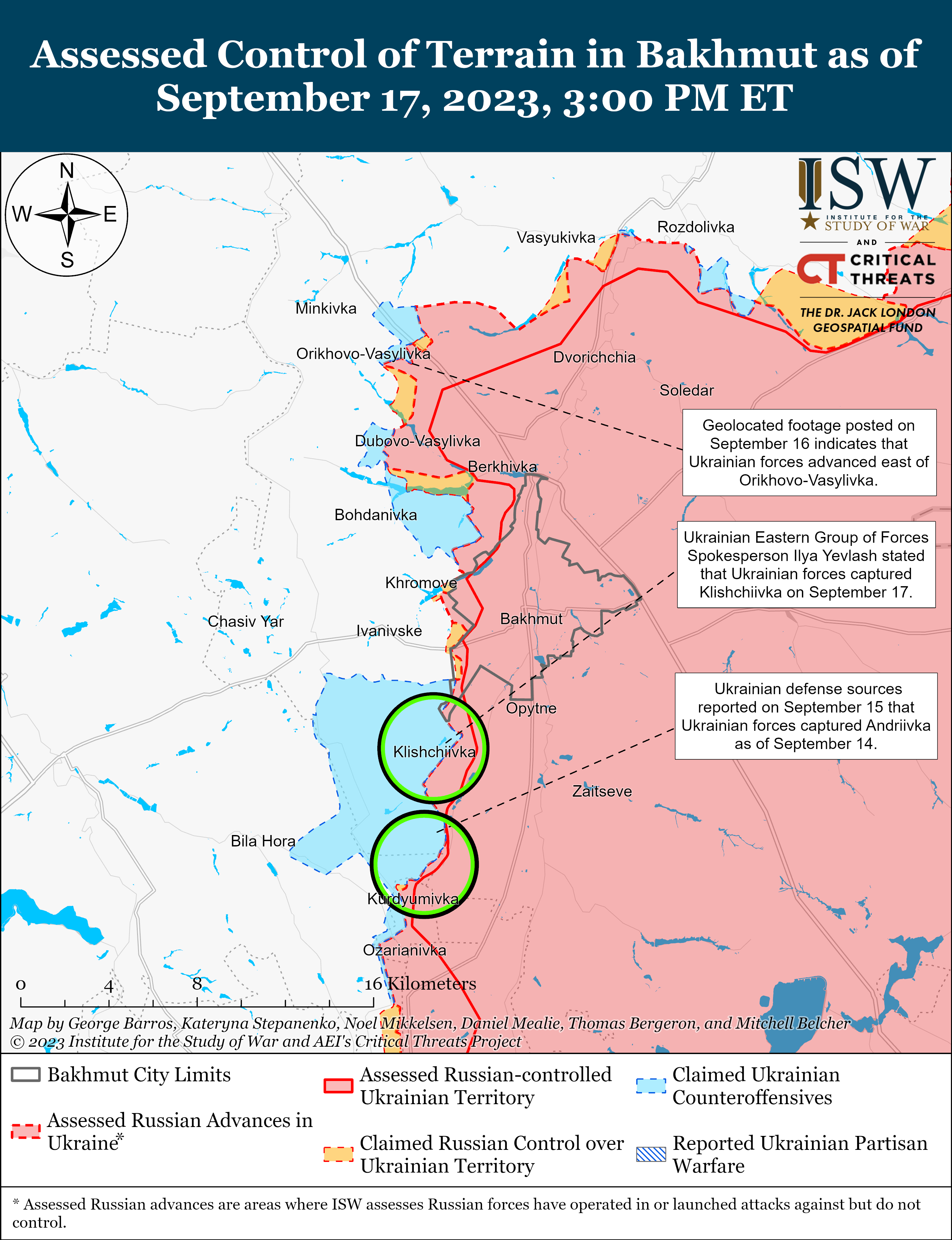 Ukrainian forces liberated Klishchiivka, south of Bakhmut, on September 17 and continued successful offensive operations elsewhere in the Bakhmut direction. Geolocated footage posted on September 17 shows Ukrainian forces holding up flags in Klishchiivka (7km southwest of Bakhmut).[1] Ukrainian Eastern Group of Forces Spokesperson Captain Ilya Yevlash later confirmed that Ukraine has liberated Klishchiivka, and Ukrainian President Volodymyr Zelensky congratulated the Ukrainian 80th Air Assault Brigade, 5th Assault Brigade, 95th Air Assault Brigade, and National Police “Lyut” Assault Brigade for their role in liberating the settlement.[2] Further geolocated footage posted on September 16 shows that Ukrainian forces have captured positions east of Orikhovo-Vasylivka (10km northwest of Bakhmut).[3] The liberation of Klishchiivka, as well as continued Ukrainian tactical gains northwest of Bakhmut,are tactical gains of strategic significance because they are allowing Ukrainian forces to fix a considerable portion of Russian airborne (VDV) elements in the Bakhmut area, as ISW’s Daniel Mealie discusses in the September 17, 2023 special edition.
Ukrainian forces liberated Klishchiivka, south of Bakhmut, on September 17 and continued successful offensive operations elsewhere in the Bakhmut direction. Geolocated footage posted on September 17 shows Ukrainian forces holding up flags in Klishchiivka (7km southwest of Bakhmut).[1] Ukrainian Eastern Group of Forces Spokesperson Captain Ilya Yevlash later confirmed that Ukraine has liberated Klishchiivka, and Ukrainian President Volodymyr Zelensky congratulated the Ukrainian 80th Air Assault Brigade, 5th Assault Brigade, 95th Air Assault Brigade, and National Police “Lyut” Assault Brigade for their role in liberating the settlement.[2] Further geolocated footage posted on September 16 shows that Ukrainian forces have captured positions east of Orikhovo-Vasylivka (10km northwest of Bakhmut).[3] The liberation of Klishchiivka, as well as continued Ukrainian tactical gains northwest of Bakhmut,are tactical gains of strategic significance because they are allowing Ukrainian forces to fix a considerable portion of Russian airborne (VDV) elements in the Bakhmut area, as ISW’s Daniel Mealie discusses in the September 17, 2023 special edition.Russian forces launched another series of Shahed-131/136 drone and cruise missile strikes at southern Ukraine on the night of September 16-17. The Ukrainian General Staff reported that Russian forces launched six Shahed drones from the southeastern and southern directions and 10 Kh-101/555/55 air-launched cruise missiles from nine Tu-95MS strategic bombers that took off from Engels Airbase, Saratov Oblast.[4] Ukrainian Air Force Spokesperson Colonel Yuriy Ihnat noted that Russian forces mainly targeted grain infrastructure in southern Odesa Oblast, and Ukrainian military sources stated that Ukrainian forces shot down six Shaheds and six cruise missiles.[5] Ukraine’s Southern Operational Command posted images of the aftermath of one Russian strike in an unspecified part of Odesa Oblast.[6] Russian forces additionally struck civilian enterprises in Kharkiv City with four S-300 missiles.[7]
North Korean dictator Kim Jong Un concluded his trip to Russia on September 17 and received several pieces of military technical equipment from the governor of Primorsky Krai. Kremlin newswire TASS reported that Kim visited the Far Eastern Federal University on September 17, where he met with Russian military engineers.[8] TASS and other Russian sources additionally noted that Primorsky Krai Governor Oleg Kozhemyako gifted Kim a military vest, an unspecified loitering munition, and an unspecified long-range reconnaissance drone.[9] ISW previously reported that Russia may be open to forms of technological and defensive cooperation with North Korea but is unlikely to provide physical systems due to Russian fears that providing the North Korean regime with such systems may trigger further sanctions against Russia.[10] It is therefore notable that a Russian official gifted Kim with pieces of military technology that will presumably return to North Korea with Kim. United Nations sanctions specify that ”All Member States are required to prevent the direct or indirect supply, sale, or transfer to the DPRK, through their territories or by their nationals, or using their flag vessels or aircraft, and whether or not originating in their territories, of all arms and related materiel, including small arms and light weapons...”[11]
South Korean President Yoon Suuk-Yeol stated that Russian and North Korean military technical agreements may violate sanctions adopted by the UN Security Council.[12] Yoon stated that if information about these agreements is confirmed then this will be a violation of the sanctions and illegal.[13] The war in Ukraine has reportedly generated a rapid growth in South Korean arms exports as South Korea replenishes Western stocks of ammunition and systems that the West has sent to Ukraine.[14] South Korea has not yet directly supplied lethal security assistance to Ukraine.[15]
The Russian Ministry of Defense’s (MoD) effort to subsume the Wagner Group is prompting Russian officials to more openly back military juntas in West Africa. A Russian military delegation, including Russian Deputy Defense Minister Yunus-Bek Yevkurov and Main Military Intelligence Directorate (GRU) General Andrei Averyanov, arrived in Bamako, Mali on September 16.[16] Yevkurov reportedly met with the Burkinabe, Nigerien, and Malian defense ministers; Malian junta head Assimi Goita; and Burkinabe junta head Paul-Henri Sandaogo Damiba.[17] Mali, Niger, and Burkina Faso signed a security pact on September 16 promising to come to each other's aid in the case of any rebellion or external aggression.[18] The Russian military delegation’s meeting with the political and military leadership of the three junta governments before the signing of the agreement likely indicates that Russian officials are prepared to more explicitly support these juntas. Russia has previously used the Wagner Group to forge relationships with the junta governments, but the Russian MoD’s efforts to subsume Wagner’s assets and operations in West Africa have eliminated the implausible deniability that Wagner previously afforded the Russia government. Yevkurov and Averyanov appear to be heavily involved in the efforts to subsume Wagner, and their participation in the delegation suggests that they are likely using to the seizure of Wagner assets and operations to forge new agreements and partnerships with the junta governments.[19]
Prolonged concern about Chechen Republic Head Ramzan Kadyrov’s health in the Russian information space highlights Russian President Vladimir Putin’s dependence on Kadyrov for continued stability in Chechnya. The Ukrainian Main Intelligence Directorate (GUR) reportedly confirmed that Kadyrov was in a coma on September 15, prompting rumors about Kadyrov’s poor health among Russian milbloggers and insider sources.[20] Kadyrov denied the rumors about his health in a video posted on September 17.[21] The destabilization of Kadyrov’s rule in Chechnya would be a major blow to Putin’s regime, in part because of how central the establishment of stability in Chechnya through a brutal and bloody war was to Putin’s early popularity in Russia. Kadyrov and other Russian officials may be concerned that continued rumors about his health will affect the long-term stability of his, and by extension Putin’s, control of Chechnya.
Key Takeaways:
- Ukrainian forces liberated Klishchiivka, south of Bakhmut, on September 17 and continued successful offensive operations elsewhere in the Bakhmut direction.
- Russian forces launched another series of Shahed-131/136 drone and cruise missile strikes at southern Ukraine on the night of September 16-17.
- North Korean dictator Kim Jong Un concluded his trip to Russia on September 17 and received several pieces of military technical equipment from the governor of Primorsky Krai.
- The Russian Ministry of Defense’s (MoD) effort to subsume the Wagner Group is prompting Russian officials to more openly back military juntas in West Africa.
- Prolonged concern about Chechen Republic Head Ramzan Kadyrov’s health in the Russian information space highlights Russian President Vladimir Putin’s dependence on Kadyrov for continued stability in Chechnya.
- Russian forces conducted offensive operations along the Kupyansk-Svatove-Kreminna line, near Bakhmut, along the Avdiivka-Donetsk City line, and in the Donetsk-Zaporizhia Oblast area on September 17 and advanced in some areas.
- Ukrainian forces also continued counteroffensive operations in western Zaporizhia Oblast.
- Recent Russian claims that small contingents of former Wagner Group personnel are returning to fight in Ukraine do not indicate that a fully reconstituted Wagner fighting force will return to Ukraine anytime soon if ever.
- Russian occupation administrations continue to forcibly deport Ukrainian children to Russia and erase Ukrainian cultural identity.
We do not report in detail on Russian war crimes because these activities are well-covered in Western media and do not directly affect the military operations we are assessing and forecasting. We will continue to evaluate and report on the effects of these criminal activities on the Ukrainian military and the Ukrainian population and specifically on combat in Ukrainian urban areas. We utterly condemn these Russian violations of the laws of armed conflict, Geneva Conventions, and humanity even though we do not describe them in these reports.
- Russian Main Effort – Eastern Ukraine (comprised of two subordinate main efforts)
- Russian Subordinate Main Effort #1 – Capture the remainder of Luhansk Oblast and push westward into eastern Kharkiv Oblast and encircle northern Donetsk Oblast
- Russian Subordinate Main Effort #2 – Capture the entirety of Donetsk Oblast
- Russian Supporting Effort – Southern Axis
- Russian Mobilization and Force Generation Efforts
- Activities in Russian-occupied areas
Russian Main Effort – Eastern Ukraine
Russian Subordinate Main Effort #1 – Luhansk Oblast (Russian objective: Capture the remainder of Luhansk Oblast and push westward into eastern Kharkiv Oblast and northern Donetsk Oblast)
The Ukrainian General Staff reported that Russian forces are conducting diversionary activities near the international border to fix Ukrainian forces in border areas and prevent them from deploying to other directions.[22] The Ukrainian General Staff added that Russian forces are increasing the density of the mine-explosive barrier along the border in Belgorod Oblast. A Russian milblogger claimed that artillery and occasional combat engagements occur near Strilecha (25km northeast of Kharkiv City) on the international border.[23]
Russian forces continued offensive operations on the Kupyansk-Svatove-Kreminna frontline on September 17 and made limited territorial gains southwest of Kreminna.[24] Geolocated footage published on September 17 indicated that Russian forces made slight advances south of Dibrova (5km southwest of Kreminna).[25] Ukrainian Eastern Group of Forces Spokesperson Captain Ilya Yevlash stated that Russian forces are trying to regroup along the Kupyansk-Svatove line following failures near Novoyehorivka (15km southwest of Svatove), which has led to a decrease in Russian activity on this line.[26] A Russian milblogger also claimed that Russian forces attacked near Kyslivka (20km southeast of Kupyansk).[27]
Russian sources claimed that Ukrainian forces conducted unsuccessful offensive operations near Kreminna on September 17. The Russian Ministry of Defense (MoD) claimed that Russian troops of the Central Grouping of Forces repelled Ukrainian attacks near Dibrova, Torske (13km west of Kreminna), and in the Serebryanske forest area.[28]
Russian Subordinate Main Effort #2 – Donetsk Oblast (Russian objective: Capture the entirety of Donetsk Oblast, the claimed territory of Russia’s proxies in Donbas)
Ukrainian forces liberated Klishchiivka (7km southwest of Bakhmut) and made advances elsewhere in the Bakhmut direction on September 17. Ukrainian Eastern Group of Forces Spokesperson Captain Ilya Yevlash stated that Ukrainian forces liberated Klishchiivka, and Ukrainian forces released several videos from Klishchiivka during the day wherein they stated that they had liberated the settlement.[29] The Ukrainian announcements of the liberation show Ukrainian forces operating freely in the settlement.[30] Russian milbloggers denied that Ukrainian forces liberated Klishchiivka and claimed that Ukrainian forces only control the southern and central parts of the settlement.[31] Another milblogger acknowledged that Russian forces have entrenched themselves near the railway east and northeast of Klishchiivka but that they do not maintain positions in the settlement itself.[32] Footage published on September 17 shows Ukrainian forces firing on Russian forces on the outskirts of Klishchiivka and forcing them to retreat.[33] Additional geolocated footage published on September 16 indicates that Ukrainian forces made gains east of Orikhovo-Vasylivka (11km northwest of Bakhmut).[34] Russian milbloggers claimed that Russian forces repelled several Ukrainian assaults on Bakhmut’s northern flank, and that fighting is ongoing near Andriivka (10km southwest of Bakhmut), which they claimed is a contested ”gray zone.”[35]
Russian forces counterattacked in the Bakhmut area on September 17 but did not make any confirmed gains. The Ukrainian General Staff reported that Ukrainian forces repelled five Russian assaults near Klishchiivka and Bila Hora (14km southwest of Bakhmut) and repelled Russian counterattacks near Andriivka and Kurdyumivka (13km southwest of Bakhmut).[36] Russian milbloggers claimed that Russian forces are counterattacking near Klishchiivka and unsuccessfully tried to push Ukrainian forces out of positions near Bohdanivka (7km northwest of Bakhmut).[37] Yevlash stated that Russian forces currently have 52,000 personnel deployed to the Bakhmut direction.[38]
Ukrainian forces conducted limited ground attacks along the Avdiivka-Donetsk City front on September 17 and advanced. Geolocated footage published on September 16 indicates that Ukrainian forces had made further gains east of Krasnohorivka (22km southwest of Avdiivka).[39] The Russian Ministry of Defense (MoD) claimed that elements of the Russian Southern Grouping of Forces repelled Ukrainian assaults near Marinka (27km southwest of Avdiivka).[40]
Russian forces continued limited offensive operations along the Avdiivka-Donetsk City front on September 17 but did not make any confirmed gains. The Ukrainian General Staff reported that Russian forces conducted unsuccessful offensive actions near Avdiivka, Sieverne (11km southwest of Avdiivka), and Marinka.[41] Ukrainian Tavriisk Group of Forces Spokesperson Colonel Oleksandr Shtupun stated that Russian forces usually conduct 10 to 15 assaults near Marinka every day with motorized rifle units as well as combined ”Storm” and ”Storm-Z” units.[42] A Russian news aggregator claimed that Russian forces attacked south of Avdiivka and near Opytne (4km south of Avdiivka) on September 16.[43]
Russian Supporting Effort – Southern Axis (Russian objective: Maintain frontline positions and secure rear areas against Ukrainian strikes)
Russian sources claimed that Ukrainian forces continued offensive operations in the Donetsk-Zaporizhia Oblast area on September 17 but did not advance. Russian sources, including the Russian Ministry of Defense (MoD), claimed that Ukrainian forces continued attacks along the Novodonetske-Novomayorske line (13-19km southeast of Velyka Novosilka), near Staromayorske (10km south of Velyka Novosilka), and near Pryyutne (15km southwest of Velyka Novosilka).[44] Several Russian sources reported that fighting in this sector has largely assumed a positional nature and claimed that some Ukrainian units are rotating in this area.[45]
Russian forces conducted counterattacks in the Donetsk-Zaporizhia Oblast area on September 17 and reportedly advanced. The Ukrainian General Staff reported that Russian forces conducted unsuccessful offensive operations near Novodarivka (15km southwest of Velyka Novosilka) and Rivnopil (10km southwest of Velyka Novosilka).[46] A Russian milblogger claimed that Russian forces attacked towards Urozhaine (10km south of Velyka Novosilka), and another Russian source claimed that Russian forces knocked Ukrainian troops out of unspecified positions near Pryyutne.[47] One Russian milblogger noted that elements of the “Vostok” Battalion and Donetsk People’s Republic (DNR) “Kaskad” formation are defending against Ukrainian attacks in this sector and inflicting high losses on Ukrainian troops.[48] Russian milbloggers claimed that elements of the 39th Motorized Rifle Brigade (68th Army Corps, Eastern Military District), Aerospace Forces (VKS), 36th Combined Arms Army (Eastern Military District), and 40th Naval Infantry Brigade (Pacific Fleet) are engaged in the area.[49]
Ukrainian forces continued offensive operations in western Zaporizhia Oblast on September 17 and did not make any confirmed gains. Ukrainian military sources reported that Ukrainian forces continued offensive operations in the Melitopol (western Zaporizhia Oblast) direction and were successful in unspecified areas.[50] The Russian MoD claimed that Russian forces repelled a Ukrainian attack near Robotyne (13km south of Orikhiv).[51] Russian milbloggers claimed that heavy fighting continued along the Robotyne-Verbove line, particularly in the direction of Novoprokopivka (just south of Robotyne).[52] One Russian source claimed that Ukrainian forces are using groups of two to three people to try and advance south of Robotyne.[53]
Russian sources claimed that Russian forces conducted limited counterattacks in western Zaporizhia Oblast on September 17. Russian milbloggers claimed that Russian forces are counterattacking near Robotyne and from positions near Novoprokopivka and Kopani (12km southwest of Orikhiv).[54] Russian sources claimed that elements of the 7th Guards Mountain Air Assault (VDV) Division, particularly the 247th VDV Regiment, are defending south of Orikhiv.[55]
Russian sources claimed that Ukraine targeted occupied Crimea with drones on September 17. The Russian MoD claimed that Russian air defenses downed four Ukrainian drones over the northwestern and eastern coasts of Crimea early in the morning on September 17.[56] A prominent Russian milblogger claimed that Ukraine launched a total of six drones at Crimea and that the Russian "Medvedi“ (Bears) Private Military Company (PMC) detected the drones while the 31st Air Defense Division (4th Air Force and Air Defense Army, Southern Military District) shot down three drones near Portove and Cape Tarkhankut.[57] One Russian source posted an image reportedly of a downed drone near an oil depot in the area of Feodosia.[58]
Russian Mobilization and Force Generation Efforts (Russian objective: Expand combat power without conducting general mobilization)
Recent Russian claims that small contingents of former Wagner Group personnel are returning to fight in Ukraine do not indicate that a fully reconstituted Wagner fighting force will return to Ukraine anytime soon if ever. Russian milbloggers, including a Wagner-affiliated Russian milblogger, claimed on September 17 that a small number of fighters from the 3rd Platoon of Wagner’s 1st Assault Detachment assembled an independent group and returned to the front in Ukraine.[59] A Russian milblogger claiming to be affiliated with Wagner claimed that the fighters likely signed contracts with the Russian Ministry of Defense (MoD).[60] It is possible that a small number of Wagner personnel have signed Russian MoD contracts as part of the Russian MoD's efforts to integrate Wagner personnel into conventional Russian formations amid the continued uncertainty of Wagner’s future domestically and abroad.[61] Another Russian milblogger claimed on September 16 that ”Wagner veterans” are fighting near Klishchiivka in Donetsk Oblast.[62] ISW continues to assess that it is unlikely that the Kremlin will restore Wagner as a large-scale quasi-independent organization under a unified command independent of the Kremlin or Russian MoD, which is the only likely form in which Wagner personnel would present a significant threat to the Ukrainian military again.[63]
Forbes estimated on September 16 that the Russian government has spent around $167.3 billion on the war in Ukraine from February 2022 to August 2023, based on data from the Ukrainian General Staff.[64] Forbes reported that the Russian government has spent $51.3 billion on materiel for military operations, $35.1 billion on military salaries, $46.6 billion on compensation for the families of deceased or wounded Russian servicemen, and $34 billion on destroyed equipment.[65] Forbes estimated that the Russian government spends $300 million per day on the war in Ukraine.[66]
Russian authorities reportedly continue efforts to forcibly mobilize residents of occupied Ukraine. Ukrainian Luhansk Oblast Military Administration Head Artem Lysohor stated on September 17 that Russian authorities presented military summonses to men living in Starobilsk Raion, occupied Luhansk Oblast.[67] Lysohor stated that Russian authorities even gave summonses to men who do not have Russian passports in Pidhorivka, Starobilsk Raion.[68]
Activities in Russian-occupied areas (Russian objective: Consolidate administrative control of annexed areas; forcibly integrate Ukrainian citizens into Russian sociocultural, economic, military, and governance systems)
Russian occupation administrations continue to forcibly deport Ukrainian children to Russia and erase Ukrainian cultural identity. The Kherson Oblast occupation administration stated on September 17 that occupation officials sent schoolchildren between the ages of nine and 17 to Moscow for the “Culture Map 4+85” all-Russian cultural and education exchange program.[69] The Kherson Oblast occupation administration reportedly plans to send thousands of local children to Moscow and St. Petersburg for similar programs by the end of 2023.[70] Occupation authorities in Donetsk, Luhansk, and Zaporizhia oblasts will also send an unspecified number of local children to Russia for these programs.[71] Russian Culture Minister Olga Lyubimova reportedly stated that at least 10,000 school children from the occupied territories will take part in the “Culture Map 4+85” program in 2023 and get “acquainted with the rich cultural history of our [Russia].”[72] These programs are likely part of Russia’s wider campaign to forcibly deport Ukrainian children to Russia and forcibly assimilate them into the Russian sociocultural sphere.
The Russian Republic of Mordovia continues to expand its patronage network in occupied Kherson Oblast. Kherson Oblast occupation administration head Vladimir Saldo stated on September 17 that he met with Republic of Mordovia Head Artyom Zdunov to discuss Mordovia’s recent infrastructure projects in occupied Kherson Oblast, including the renovation and construction of public infrastructure and housing.[73] Saldo claimed that Zdunov also agreed to build a resort in occupied Kherson Oblast.[74]
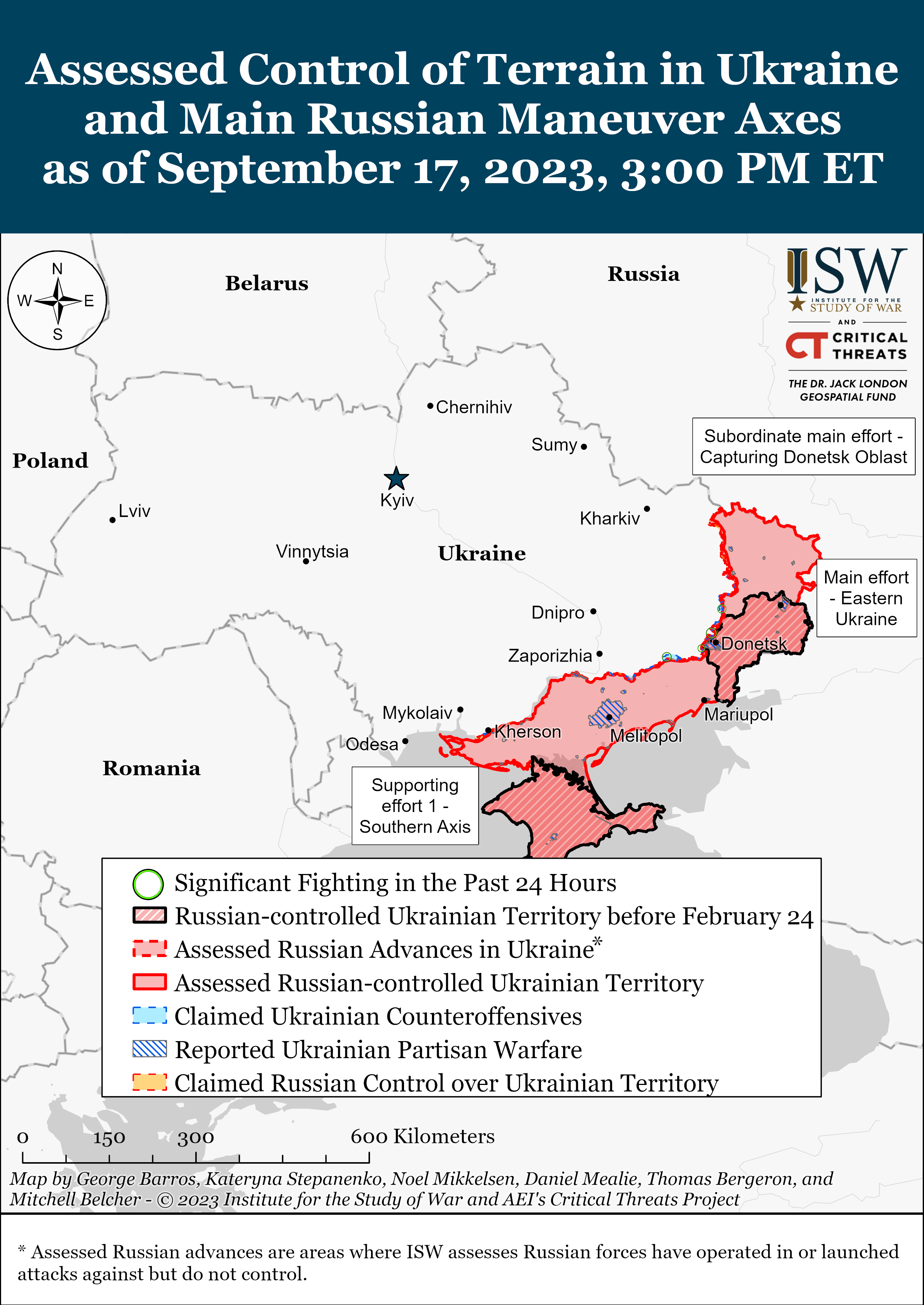
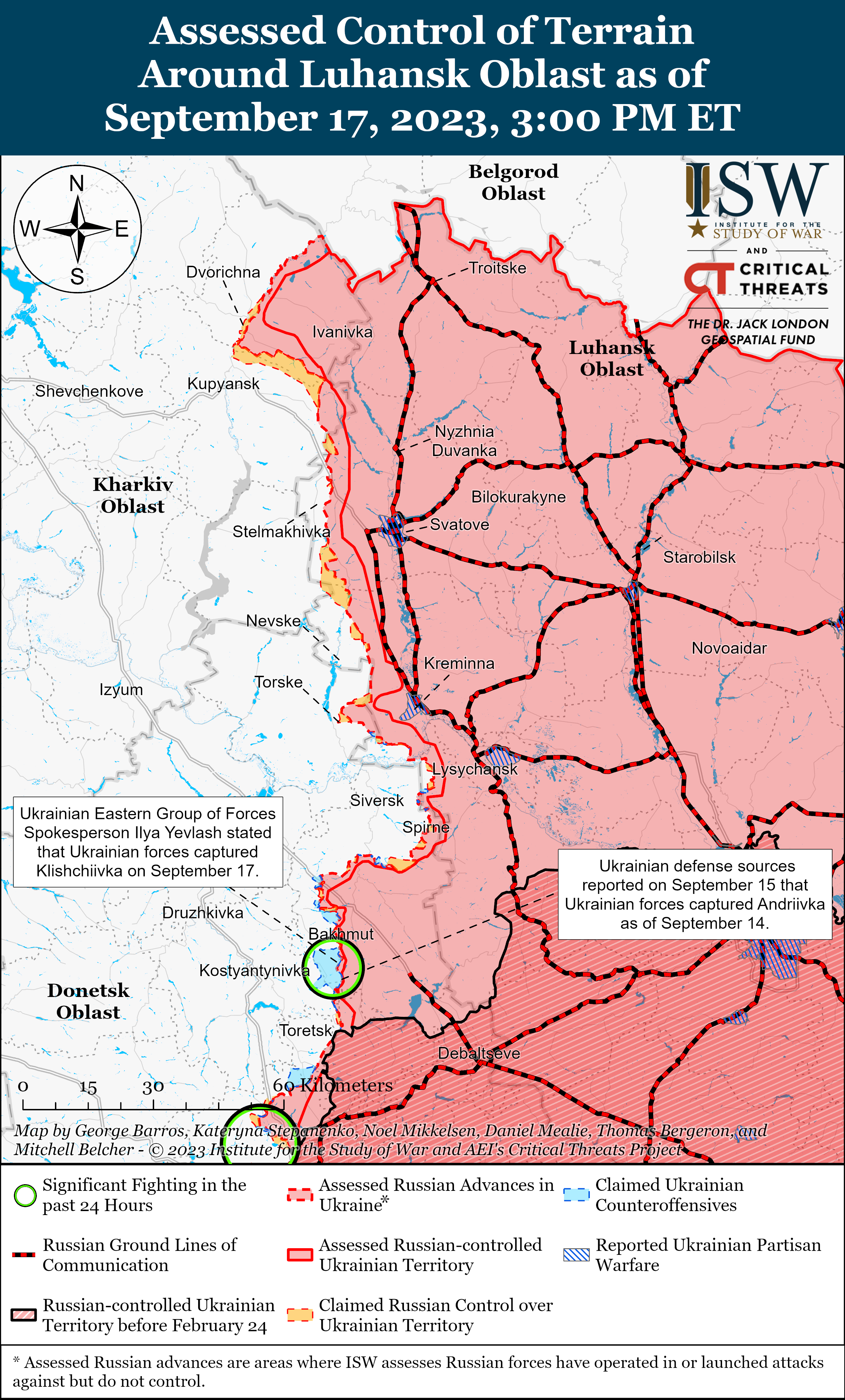
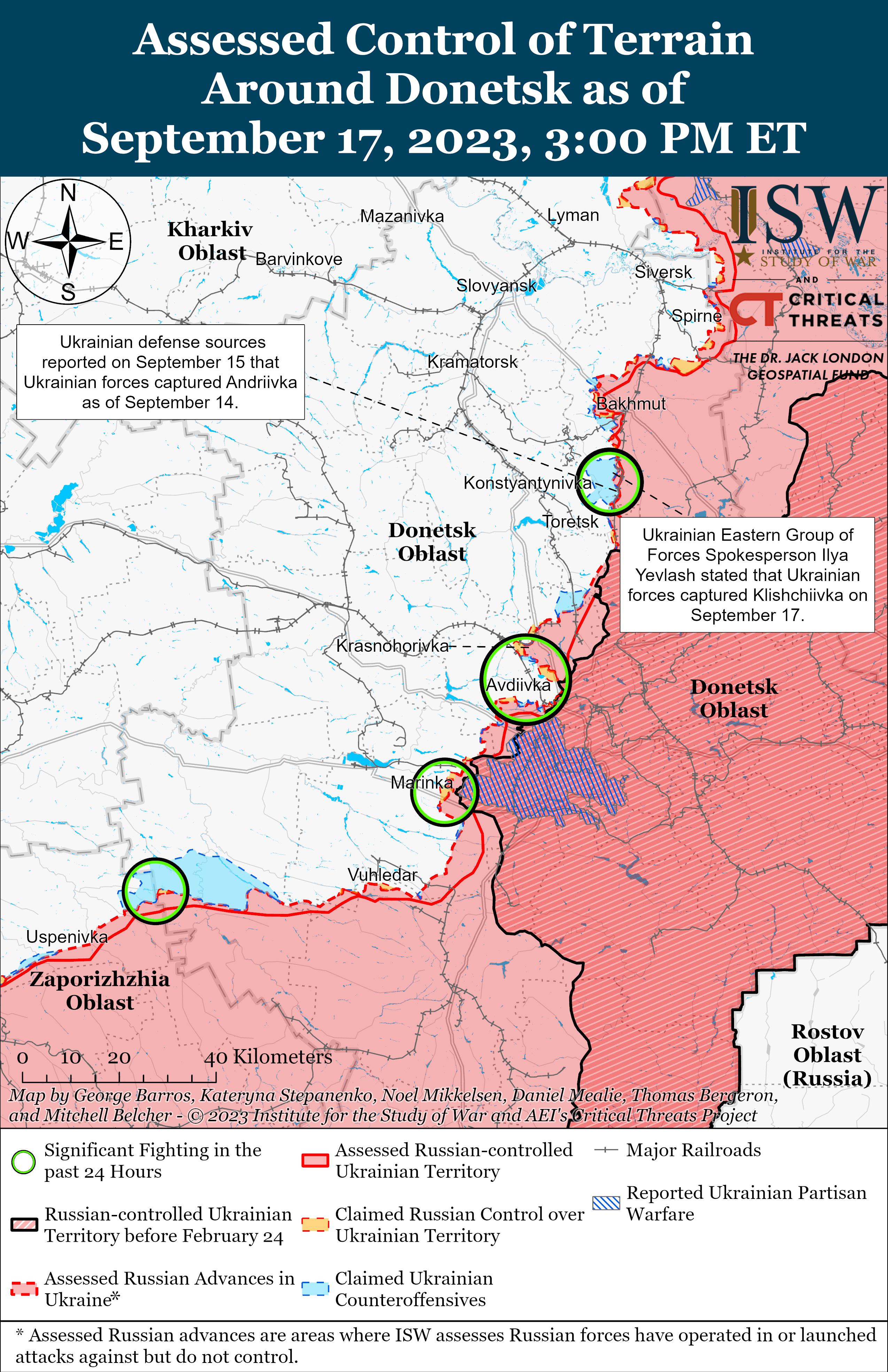
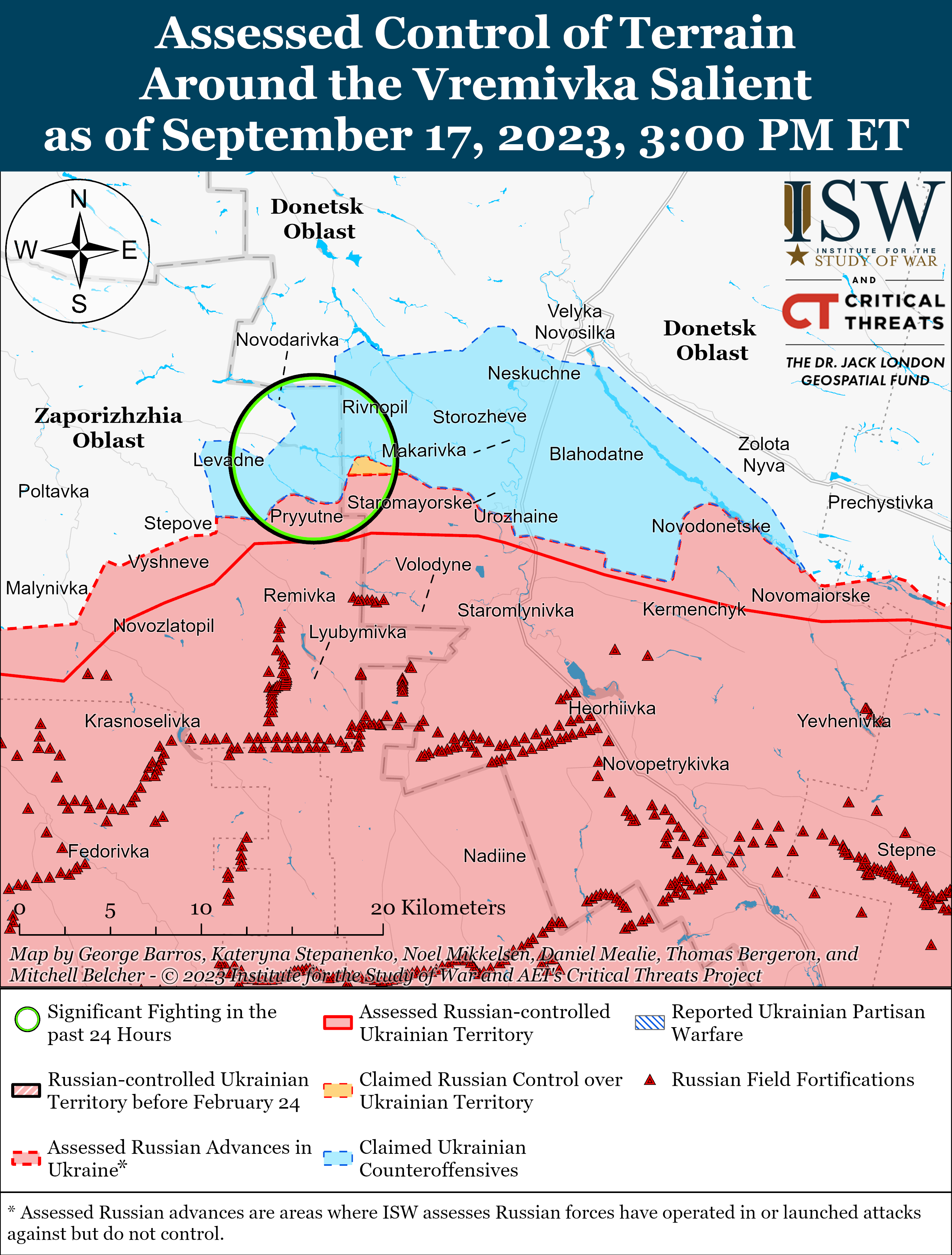
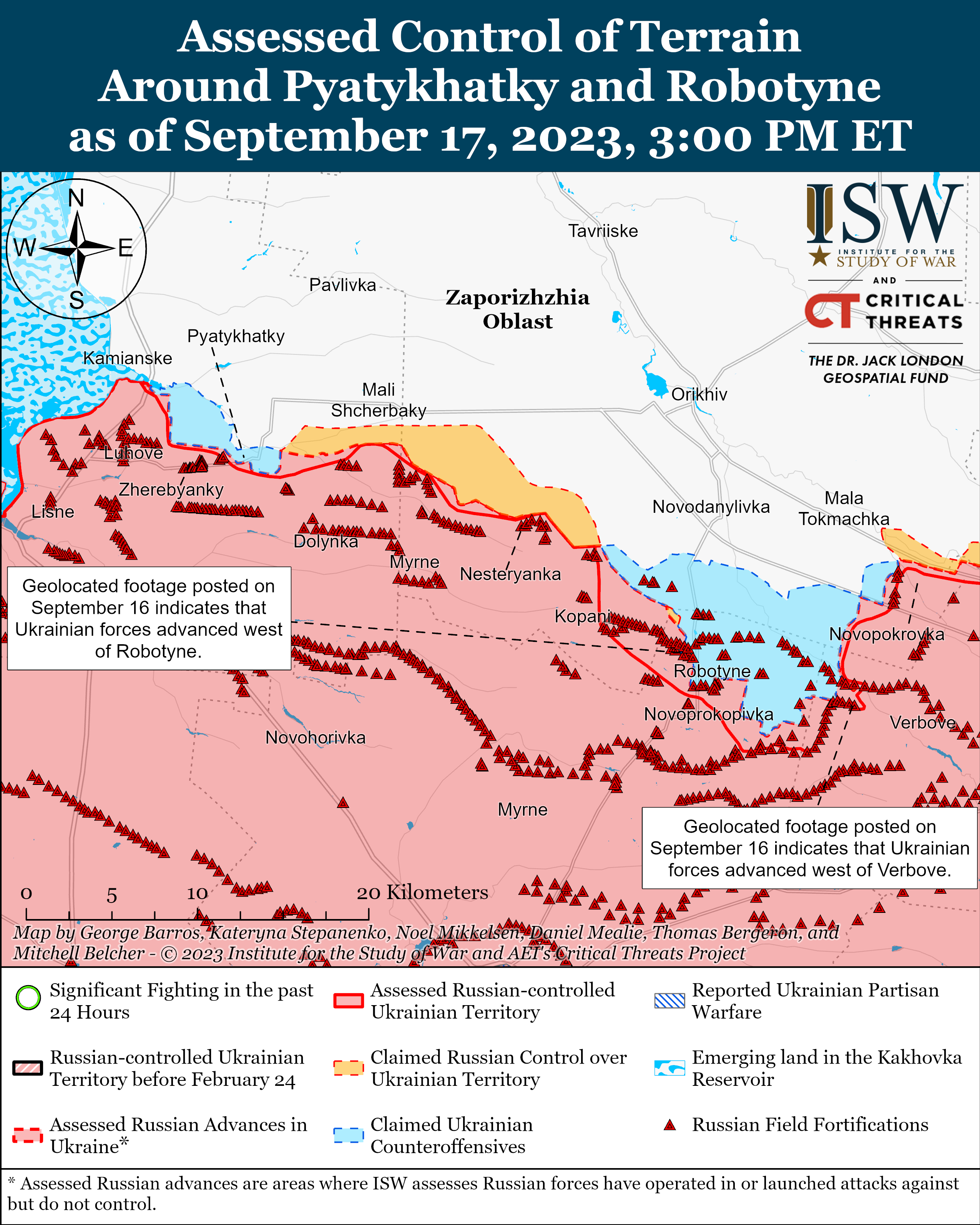
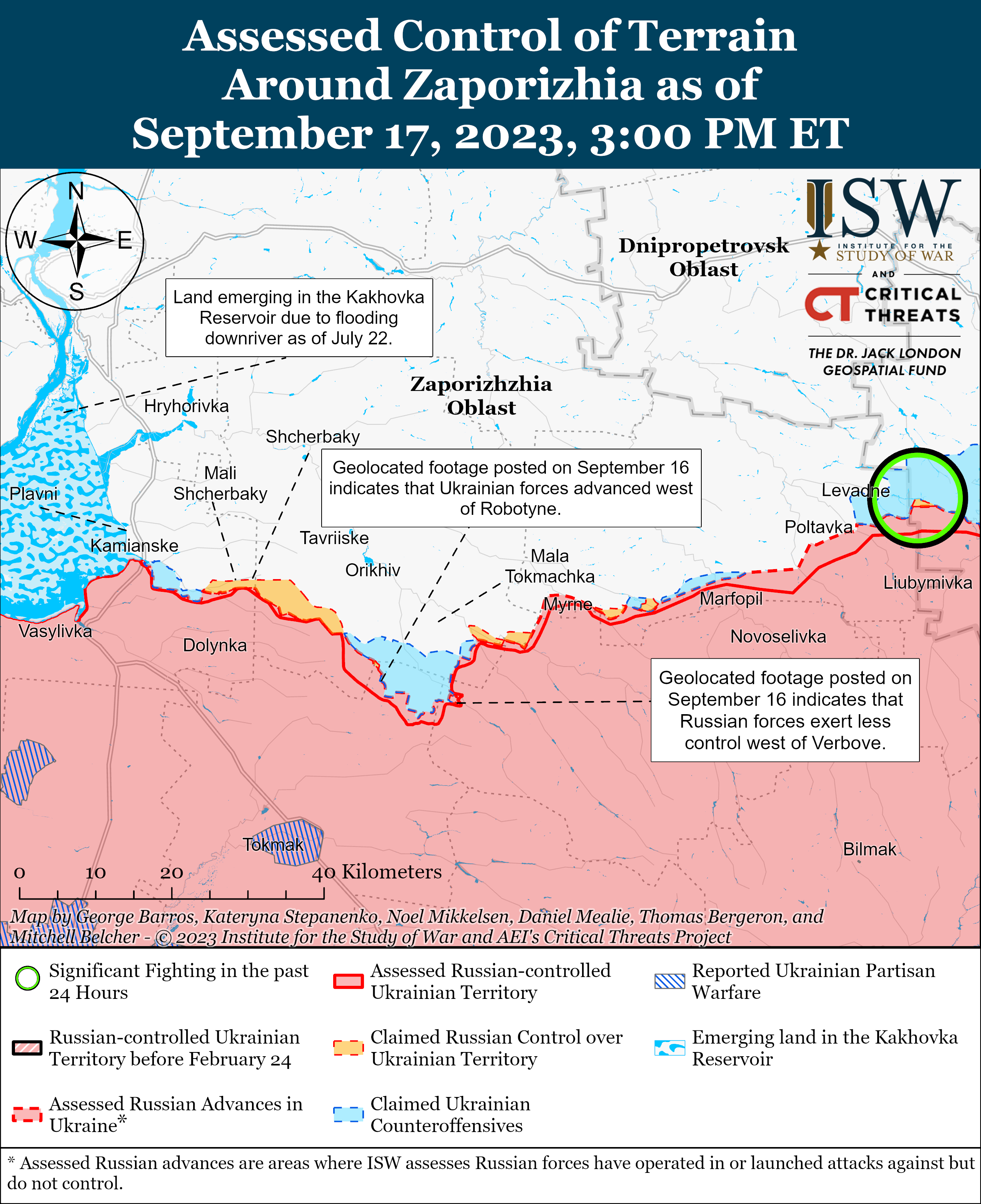
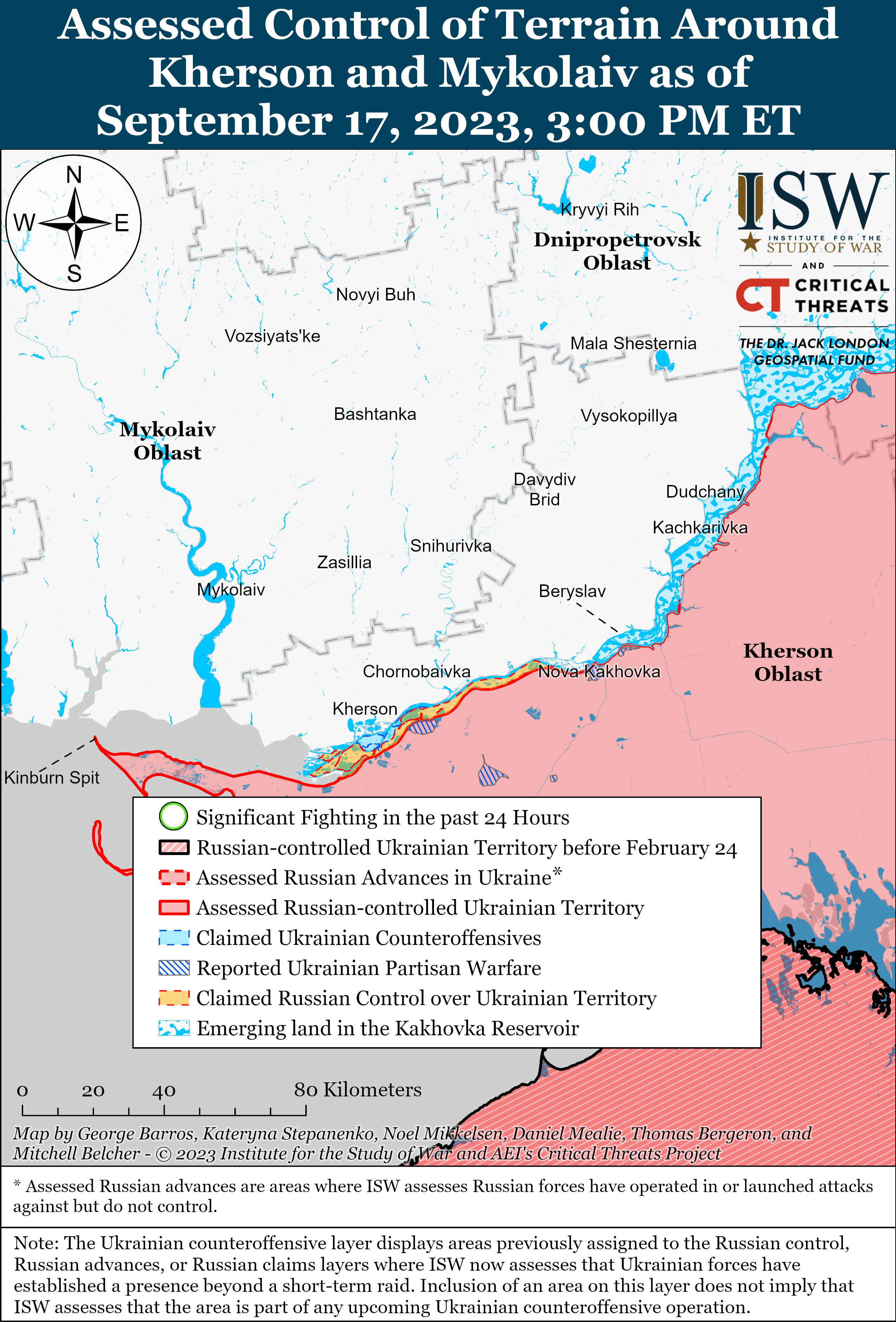
No comments:
Post a Comment